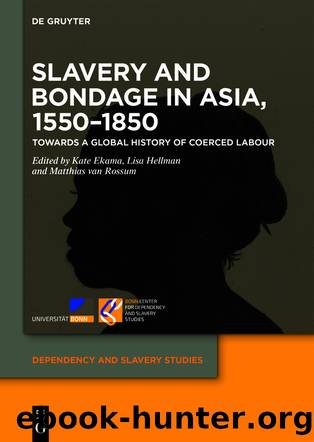Slavery and Bondage in Asia, 1550â1850 by Kate Ekama Lisa Hellman Matthias van Rossum

Author:Kate Ekama, Lisa Hellman, Matthias van Rossum
Language: eng
Format: epub
Publisher: De Gruyter
Published: 2022-06-22T12:48:50.751000+00:00
The labour classes mentioned in this passage will be explained later. For the moment, let us just note the salary rates: the free artisans (carpenters and blacksmiths) received one ganta per day, and the slaves (the âothersâ) received a half-ganta per day. For both of these groups, salary was paid on a day-by-day basis. When the workers did not work, they were not paid.
This salary system caused financial loss for the debt bondsmen, royal slaves, and free clients. We have seen that the Sultan had distributed basic necessities regularly, as a general patronal duty, regardless of the actual work done. In contrast, the Portuguese directly linked payment to work. To make matters worse, they did not have slaves work on a consistent basis. For example, Francisco Cardosoâs records show that on January 24, 1514, pay was distributed to 27 unchained slaves.44 In contrast, on August 14, 1514, pay was distributed to 182 unchained slaves.45 The numbers seem to swing wildly from day to day. One suspects that certain slaves, such as the court attendants, who had been serving almost every day under the Sultanate, now found themselves rather idle â without work and without rice.
The royal slaves also lost income for another reason. They had formerly run the Sultanateâs bureaucracy, led troops, and captained the ships. But now Portuguese lackeys took over these positions. (The nepotism of the successive Portuguese administrations was a topic of endless complaint in the city.46) While the royal slaves continued to work in the same administrative offices, and while they continued to help aboard the ships, they no longer had official leadership. They apparently dropped from the status of administrator to that of assistant. This demotion probably eliminated much of their supplemental income: the former slave trade administrators could no longer cut private deals; the former slave captains could no longer rent out cargo space. While their official salary was maintained, their unofficial income, which was much more important, was taken away.
Perhaps less intentionally, the Portuguese also caused the debt bondsmen and the free clients to lose income for still another reason. As mentioned, under the Sultanate, it was common for bondsmen to independently work for third parties. Presumably the free clients were doing the same. However, it seems that under the Portuguese administration, such third parties largely ceased to exist. It is not entirely clear why. We only know this from later problems that arose, which we will see later in this chapter. Perhaps one major issue was that the Portuguese formed a cultural and economic bubble within the city, a European enclave within a Southeast Asian port.47 The debt bondsmen seem to have committed themselves to this enclave, many converting to Christianity.48 They were thus rather cut off from the surrounding Muslim community, and consequently from their former business contacts. In any case, it seems that many could no longer supplement their salary by working for others. Increasingly, they were trapped in a cycle of poverty.
In summary, we can see the problem of âframeworksâ generating the salary crisis.
Download
This site does not store any files on its server. We only index and link to content provided by other sites. Please contact the content providers to delete copyright contents if any and email us, we'll remove relevant links or contents immediately.
| Civilization & Culture | Expeditions & Discoveries |
| Jewish | Maritime History & Piracy |
| Religious | Slavery & Emancipation |
| Women in History |
Cecilia; Or, Memoirs of an Heiress — Volume 1 by Fanny Burney(31332)
Cecilia; Or, Memoirs of an Heiress — Volume 3 by Fanny Burney(30934)
Cecilia; Or, Memoirs of an Heiress — Volume 2 by Fanny Burney(30889)
The Secret History by Donna Tartt(16623)
Sapiens: A Brief History of Humankind by Yuval Noah Harari(13053)
Leonardo da Vinci by Walter Isaacson(11903)
The Radium Girls by Kate Moore(10907)
Sapiens by Yuval Noah Harari(4537)
The Wind in My Hair by Masih Alinejad(4424)
How Democracies Die by Steven Levitsky & Daniel Ziblatt(4398)
Homo Deus: A Brief History of Tomorrow by Yuval Noah Harari(4279)
Endurance: Shackleton's Incredible Voyage by Alfred Lansing(3844)
The Silk Roads by Peter Frankopan(3760)
Man's Search for Meaning by Viktor Frankl(3631)
Millionaire: The Philanderer, Gambler, and Duelist Who Invented Modern Finance by Janet Gleeson(3569)
The Rape of Nanking by Iris Chang(3516)
Hitler in Los Angeles by Steven J. Ross(3437)
The Motorcycle Diaries by Ernesto Che Guevara(3332)
Joan of Arc by Mary Gordon(3258)
